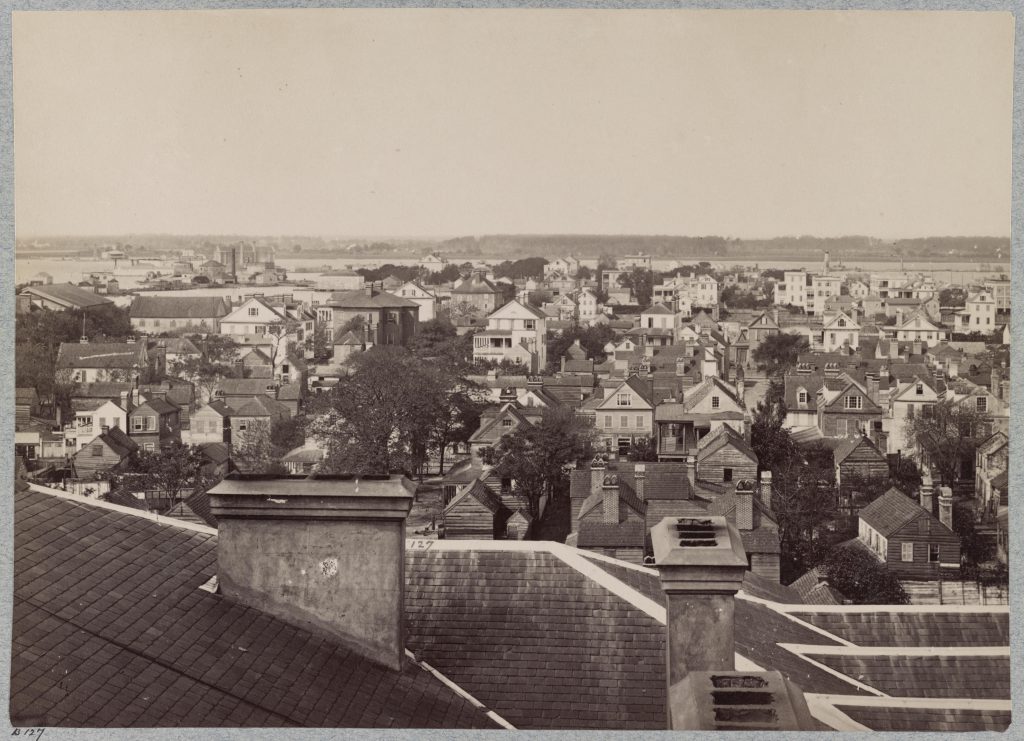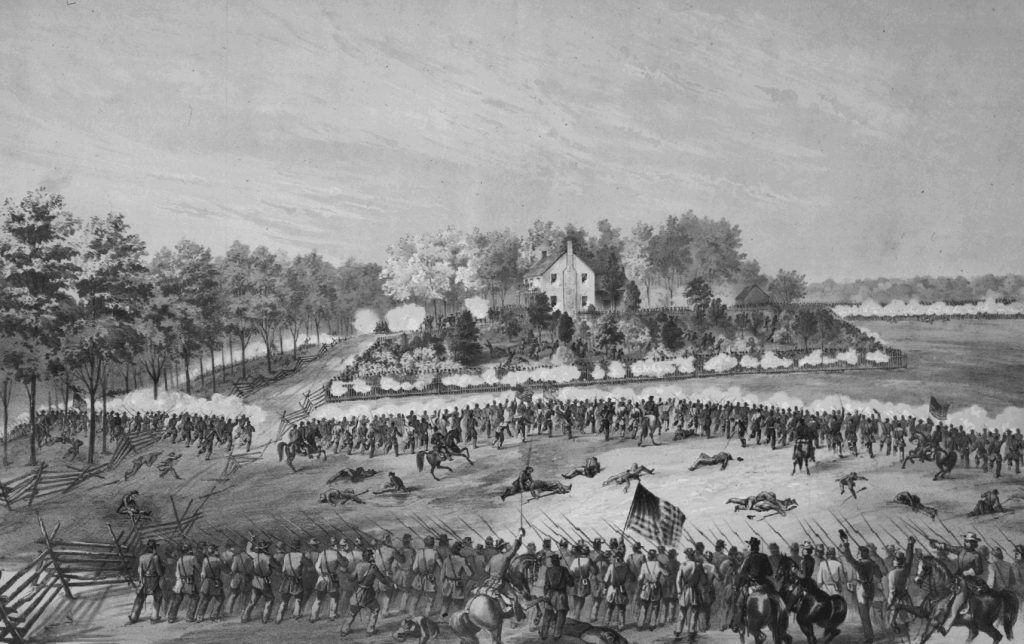Research Arsenal Spotlight 14: Alfred Homer Johnson of the 30th Georgia Infantry
This week our spotlight is on a collection of five letters related to Alfred Homer Johnson who served as a private in Company F of the 30th Georgia Infantry. Alfred Homer Johnson was the son of Handy William Johnson and Frances Matilda (McKneeley) Johnson and was born in Griffin, Georgia. During the war, Handy William Johnson was part of the 2nd Georgia Reserves, while four of his sons, including Alfred Homer Johnson, also joined the Confederate army.
Alfred Homer Johnson first enlisted for one year in Company C of the 39th Georgia Infantry on September 25, 1861. Around May, 1862, he enlisted for the duration of the war in the 30th Georgia Infantry, this time in Company F. Two of his brothers served in the same regiment: James Archibald Johnson and William Gilben “Gip” “Dill” Johnson. A third brother, O. Sidney Johnson, served in the 3rd Georgia Reserves until also transferring to Company F of the 30th Georgia Infantry in May, 1864.
The 30th Georgia Infantry in South Carolina

The first letter in our collection written by Alfred Homer Johnson on April 8, 1863. By this time he had already been serving in the 30th Georgia Infantry for about a year. His brothers, James Archibald Johnson, and William Gilben “Gip” Johnson were also serving with him. His youngest brother, O. Sidney Johnson, was about 15 years old and still to young to join the regiment.
The 30th Georgia Infantry had already served duty in Florida, Georgia, and North Carolina. At the present moment they were part of the defenses of Charleston, South Carolina. And in his letter, Alfred Homer Johnson wrote that he expected a fight soon:
“We are well. I hant got any news to write—only we are here waiting for a fight. We are expecting to be ordered to the battlefield every hour. The Yankees has 9 ironclads inside of the bar now and 40 standing just below the bar now and 75 transports down in the river. That is the news we get out here. I don’t know how true it may be.
We left Gip at Savannah. He is well. We will go back to Savannah just as soon as the excitement is over here at Charleston.”
Despite Alfred Homer Johnson’s fears of an imminent battle, the 30th Georgia Infantry was soon removed from Charleston and sent to Mississippi. It was there that he faced a much more trying moment at the Battle of Jackson.
Alfred Homer Johnson and the Battle of Jackson, Mississippi

In May of 1863, the 30th Georgia Infantry was stationed in Mississippi and facing off against General Ulysses S. Grant’s Vicksburg Campaign. In between the Union Army and Vicksburg was the city of Jackson, Mississippi, and Confederate Forces under command of General Joseph E. Johnston.
Believing that the city could not be defended, General Johnston had his forces withdraw, and his rear guard clashed with Union forces on May 14, 1863. In a letter written on May 23, Alfred Homer Johnson detailed the battle to his parents and the whereabouts of his brothers serving with him:
“There has been a fight at Jackson. We was there in time of the fight. I can’t say that we was in it although all of the boys think we was in it. It is true we was on the battlefield. I only shot three times and if they had come in sight of me, I would have shot more but I wanted to see them. The [buns?] and balls fell very thick around us. I was not scared a bit—more than if it had a been hail. James was not there in the time of the fight, nor Gip. I sent him off in the rear. The Yankees would have taken every one of us if we’ens hadn’t got away just as we did. General Johnston did not intend to fight there. Our force commenced retreating in the night before the fight came next morning. We was left there to hold them in check so our force could get away.
We lost everything we had at Jackson—our clothes, knapsacks, and blankets. We hant got anything, only what we have got on. We lie on the ground every night by the fire. I done about as well with[out] blankets as I done with them. We will get some clothes and blankets I reckon before long. We have been marching every day since we have been here through the mud and it has been raining a great deal. The water is bad and hard to get.
The Yankees got three of our company—William Johnson and William Willis and Arch Head. It is some spoken that Head let the Yankees take him on purpose. I can’t say whether he did or not.”
Death of O. Sidney Johnson
In July, 1864 tragedy repeatedly struck the Johnson family. A short note sent to Handy Johnson at that time revealed grim news about three of his four sons in the Confederate Army:
“Mr. Johnson,
I will send you a word about your boys. I brought a letter from Lieut. J. M. Wise last night. Dilly are wounded in the foot very bad—left foot. Alfred in the face. Sidney are dead. He died on the 30th of June in Atlanta. — L. J. Foster”
Alfred Homer Johnson was wounded during the fighting at Kennesaw Mountain on or around June 27, 1864. His brother, O. Sidney Johnson, died from disease. William Gilben “Dilly” Johnson’s wound in the foot was recoverable, and he not only survived the war but lived until 1920.
On July 14, 1864, Alfred Homer Johnson had recovered enough from his own wounds to write to his family about the sad loss:
“Dear and beloved Mother and Father,
I seat myself to drop a few lines which will inform you of my troubles that is inflicted on me. The solemn and sad news that has come to my ear is this—that I have lost one of my brothers. I heard today that Sidney is passed from time to eternity. Oh! that the poor boy is better off than he was before. He departed from this life to another world. I was impressed that the poor boy could not stand a camp life. I hope the poor boy is better off. I hope he is where there is no war and trouble to be with him.
— Alfred H. Johnson”
Alfred Homer Johnson survived until the end of the Civil War, but finally succumbed to his wounds in 1866. His brother, James Archibald Johnson, also died of wounds received earlier on September 7, 1864.
You can read more of the Alfred Homer Johnson’s letters as well as letters by his brother, James Archibald Johnson, with a Research Arsenal membership.
We’d like to extend a special thanks to William Griffing of Spared & Shared for his work in transcribing and sharing these documents.
If you enjoyed this spotlight, you might want to check out some of our other features, like this post on a photo album of the 25th Ohio Infantry and our collection of letters by Rufus P. Staniels of the 13th New Hampshire Infantry.

